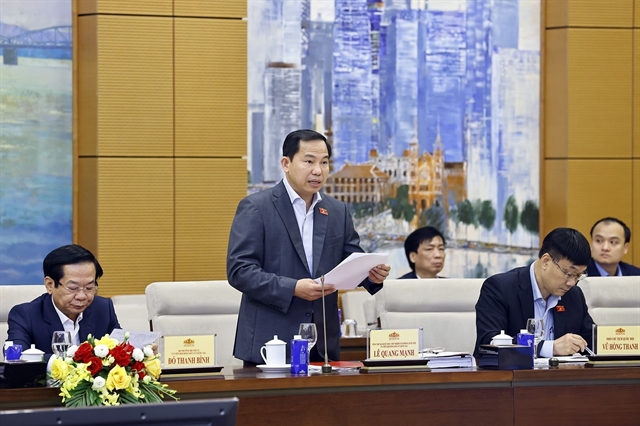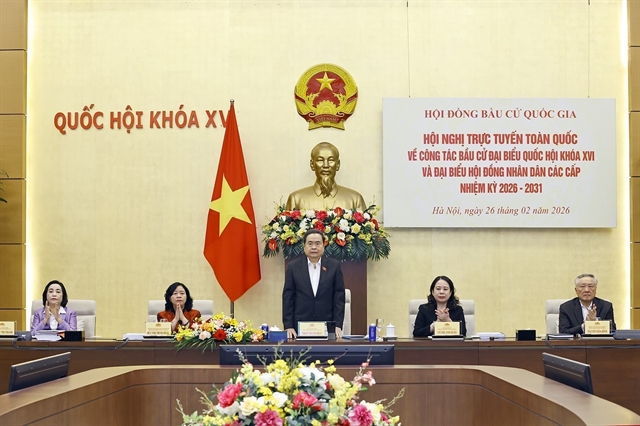 Business Beat
Business Beat

Compiled by Thiên Lý
In early November Trần Ngọc Hoa, a vegetable vendor in Hà Nội’s Kim Liên market, had to stop selling for three days after fruit and vegetable prices surged in wholesale markets.
Most vegetable prices doubled or tripled within a week.
She would have earned little, even lost, since people would not have bought from her at such high prices, she said.
“I sold a bundle of water spinach for VNĐ25,000, earning only VNĐ2,000. If just a few bundles were unsold, I would have made a loss.”
In HCM City, in late October the prices of many fruits and vegetables increased by VNĐ5,000-15,000 per kilogramme within just a week.
A kilogramme of runner beans cost VNĐ36,000, bok choy was VNĐ30,000, calabash was VNĐ30,000, Dutch tomato was VNĐ41,000, water spinach was VNĐ30,000, and choysum was VNĐ30,000.
The prices of fresh meat, poultry, dairy products, rice, and cooking oil were also up by 10-30 per cent.
Market observers said the prices of not only agricultural goods but also that of many other items of daily use were up.
The General Statistics Office (GSO) said the cost of raw materials used in several industries has risen sharply in recent months, especially October, pushing up the prices of many goods, including essential consumer items.
It pointed to the rise in fuel costs as a major factor in increasing the prices of all kinds of goods.
Petrol prices have been adjusted upward 18 times this year, making A95 VNĐ7,860 per litre higher from a year ago and E5 petrol VNĐ7,600 higher. Cooking gas prices have been hiked eight times.
Inputs used to make livestock feed have seen a 22 per cent rise in prices. Other industries affected include plastics (12.9 per cent) and textiles (10.8 per cent).
The GSO said an increase of 1 per cent in raw material prices translates into a 2.06 per cent increase in product prices.
The International Monetary Fund said the global Price Index increased by 47.82 per cent year-on-year in the first half of 2021.
Notable rises included logistics, which saw rates increase by 500 per cent on certain routes compared to pre-pandemic levels, raw materials for industrial production (56.4 per cent) and food and beverages (26.3 per cent).
What does this mean for Việt Nam?
With the country now deeply integrated into the global economy, the effects of international demand and fluctuations in raw material prices and exchange rates are felt increasingly strongly.
Imports of raw materials account for 37 per cent of the country's total production costs.
Đinh Trọng Thịnh of the Institute of Finance said the threat of inflation this year and next year is also because the country is under pressure to reopen its economy after several months of stringent restrictions to combat COVID-19.
Phạm Thế Anh of the National Economics University said the pressure to step up production of most goods and the sharp increase in the prices of inputs threatens to cause inflation.
The recovery in consumer demand is another enabling factor.
Senior economist Lê Đăng Doanh pointed out some other possible causes for inflation this year including the relief packages the Government has rolled out to support people and businesses affected by the pandemic, and cuts in banks’ lending rates to increase credit to revive the business sector.
The result is a sharp increase in money supply in the market and thus the inflation threat, he explained.
Other analysts offered more reasons for the possible rise in prices this year and next year, including the prolonged social distancing measures that caused companies’costs to skyrocket.
As major cities and provinces across the country went into lockdown for months starting in late April when the fourth wave of COVID began, thousands of workers left for their hometowns.
The resultant labour shortage meant enterprises had to recruit and train new people, Nguyễn Bích Lâm, former head of the GSO, said.
Businesses also had to keep workers on-site to prevent the spread of infection, which was also a very expensive proposition. In fact, many could not sustain it for long since it cost too much.
The model required them to follow strict anti-COVID guidelines consisting of regular testing besides providing workers with food and accommodation. In many cases, they had to build bathrooms and others for the workers.
Solution
Faced with the unexpected return of high inflation, the Government has tasked the Ministry of Industry and Trade with monitoring global oil prices and work with Ministry of Finance to analyse price- and tax-related factors to manage them closely and effectively to limit inflationary pressures.
The ministries and oil companies have been instructed to properly use the Petrol Price Stabilisation Fund.
Managing petrol prices carefully would help dampen their impact on prices and economic growth, a finance ministry official said.
Economists said to curb inflation the Government should carry out mass drives to vaccinate industrial workers and business households so that they could return to work, boosting the supply of goods and services.
The Government should also review administrative procedures to identify areas where red tape and squander could be eliminated, speed up investment in logistics infrastructure and provide interest rate cuts and subsidies and credit support, they said.
Oil could hold key
Winter this year is forecast to be bitterly cold, meaning many countries will have to expand their fuel reserves, posing upward pressure on oil prices.
The Organisation of the Petroleum Exporting Countries has announced it will not increase production as called for by major oil consumers like the US and India.
In Việt Nam, fuel accounts for around 3.52 per cent of total production costs.
A 10 per cent rise in fuel prices is estimated to pull the GDP down by around 0.7 percentage points.
Besides, since fuel accounts for 1.5 per cent of household expenses, a rise in prices results in people reallocating their income and cutting spending, reducing aggregate demand as a result.
Thịnh of the Institute of Finance said the recent rise in fuel prices is likely to impact prices in the coming months. VNS




